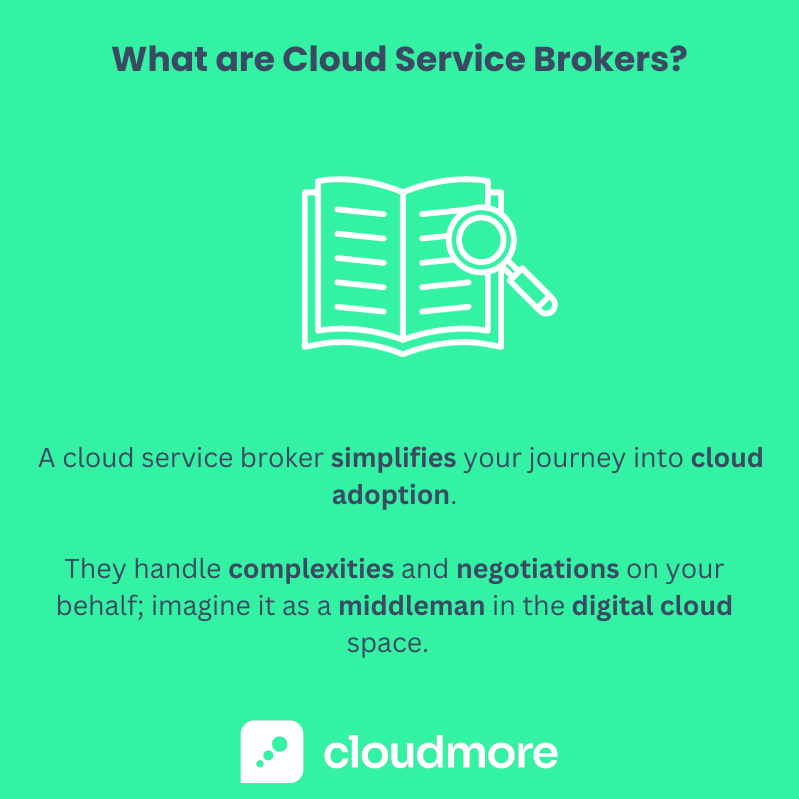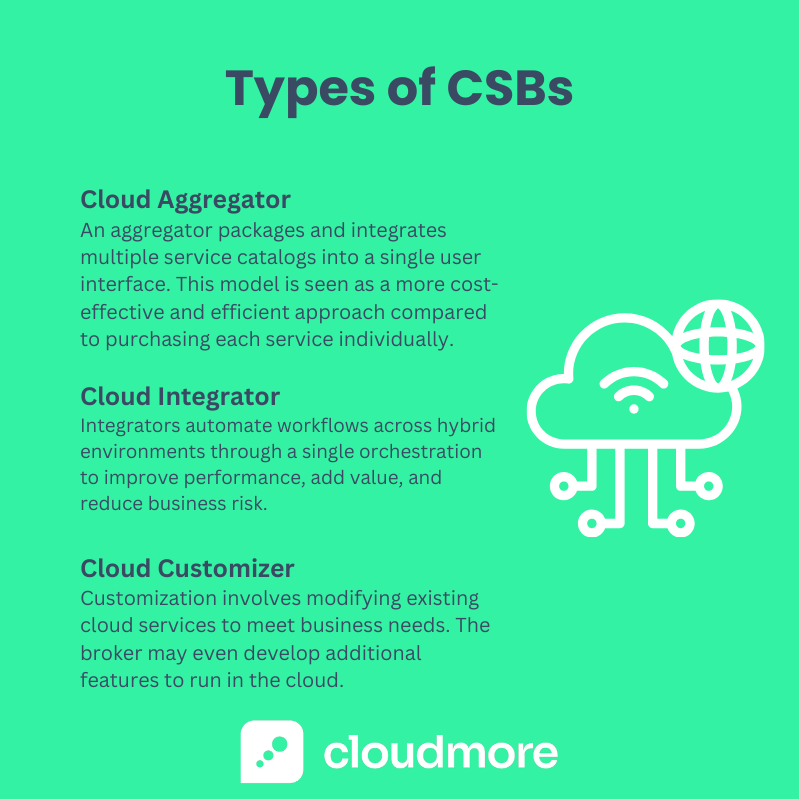Cloud Service Brokerage - Guide to Choosing a Cloud Broker
Cloud service brokerage (CSB) is an indispensable element for businesses navigating the complex cloud computing landscape.
This introductory guide delves into the essential role of cloud brokers, offering a comprehensive understanding of their impact and significance.
Cloud service brokerage stands at the forefront of technological advancement, acting as a crucial intermediary between businesses and cloud service providers.
These brokers simplify the daunting process of selecting, managing, and integrating various cloud services, ensuring that businesses can effortlessly harness the power of the cloud to drive growth and innovation.
Whether you're a small business owner or a decision-maker in a large corporation, grasping the nuances of cloud service brokerage is critical in today's digital-first environment.
Discover how cloud brokers can be the catalyst in your journey toward a more agile, secure, and cost-effective cloud strategy.
Understanding Cloud Service Brokerage
Cloud service brokerage (CSB), a term you might have encountered, is pivotal in cloud computing. Imagine it as a middleman but in the digital cloud space.
A cloud service broker simplifies your journey into cloud adoption, handling the complexities and negotiations on your behalf.

CSB in the Context of Cloud Computing
In the vast and often intricate world of cloud computing, CSB emerges as a guiding light. It's not just about providing a service; it's about enhancing the value of these services.
Whether it's integrating different cloud services, ensuring security and compliance, or managing costs, a cloud service broker plays a critical role.
CSB is the bridge that connects you to the most suitable cloud solutions tailored specifically to your organization's requirements.
The Evolution from Traditional to Cloud-Based Brokerage
The shift from traditional to cloud-based brokerage mirrors the evolution of technology itself.
In the past, brokerage services were confined to physical, tangible assets. But now, with the digital transformation, cloud brokers offer a much more dynamic and flexible service.
They navigate the ever-expanding universe of cloud services, adapting to the changing needs of businesses like yours. This transition signifies a broader change in how companies approach IT solutions – moving from a rigid, one-size-fits-all mentality to a more agile, customized approach.
The Role of a Cloud Service Broker
Navigating the cloud landscape can be daunting, but that's where a cloud service broker comes into play. Acting as a strategic intermediary, they streamline your journey into the cloud.
By handling the intricacies of selection, procurement, and management of cloud services, they ensure you get the best fit for your business needs.
A cloud broker does more than just connect you with cloud services; they optimize and personalize these services, making your transition to the cloud smooth and efficient.
Key Responsibilities of Cloud Brokers
A cloud broker wears many hats, each crucial to effectively managing cloud services. Here's a snapshot of their key responsibilities:
- Integration Management: Seamlessly integrating various cloud services to create a cohesive system.
- Customization: Tailoring cloud solutions to meet specific business requirements.
- Security and Compliance: Ensuring cloud services adhere to industry standards and regulatory requirements.
- Cost Management: Optimizing costs associated with cloud service usage.
- Support and Troubleshooting: Providing ongoing support and resolving any issues with cloud services.
Brokerage-as-a-Service: A New Paradigm
The concept of Brokerage-as-a-Service marks a significant shift in how businesses consume cloud services. It's not just about providing access to cloud services; it's about offering a comprehensive, managed solution.
This approach encompasses everything from assessing your needs to managing the end-to-end delivery of cloud services.
It's a transformative model that reflects a deeper understanding of the value and potential of cloud services in today's digital-first world.
Types of Cloud Service Brokerages
Understanding the different types of cloud service brokerages is crucial in the ever-evolving cloud landscape.
Each type offers unique services and benefits tailored to diverse business needs.

Brokerage Model Variations in Cloud Services
The world of cloud brokerage is not one-size-fits-all. Various models exist, each designed to cater to different aspects of cloud service management.
The range of models is vast, from brokers focusing solely on integration and management to those offering comprehensive solutions, including security and compliance.
These models allow businesses to choose a brokerage service that aligns closely with their specific requirements and goals.
IT Service Broker and its Significance
An IT service broker plays a critical role in modern cloud strategies. This role centers around bridging the gap between the vast array of available IT services and the specific needs of a business.
An IT service broker helps select the right cloud services and ensures these services are effectively integrated and managed within the company's existing IT infrastructure.
This ensures a seamless, efficient, and productive use of cloud technologies, which is critical for businesses aiming to stay competitive in the digital age.
Advantages of Cloud Service Brokerage
Embracing cloud service brokerage can transform how your business interacts with cloud technology. It offers a multitude of benefits that streamline and optimize your cloud experience.
.png?width=799&height=799&name=CSBs%20-%20Advantages%20%26%20Challenges%20(1).png)
Benefits of Using Cloud Brokerage Services:
- Simplified Complexity: Navigating the plethora of cloud options is easier, allowing you to focus on core business functions.
- Cost-Effectiveness: Cloud brokers can help identify the most cost-efficient cloud solutions, potentially leading to significant cost savings.
- Enhanced Security: With expertise in compliance and security standards, brokers ensure your cloud services are secure and compliant.
- Customization: Tailored solutions that align with your unique business needs, enhancing operational efficiency.
- Single Point of Contact: Simplifies management and troubleshooting, providing a streamlined communication channel.
However, there are challenges to consider:
- Dependency: Reliance on a third party for critical cloud services management.
- Service Limitations: Some brokers may have limited offerings, restricting your choices.
- Integration Issues: Potential challenges in integrating new cloud services with existing IT infrastructure.
Choosing the Right Cloud Broker
Selecting the right cloud broker is a critical decision for your business. It involves understanding what to look for, comparing different options, and learning from success stories in the cloud services brokerage market.
What to Look for in a Cloud Broker
When choosing a cloud broker, consider factors like:
- Ability to integrate various cloud services seamlessly
- Expertise in managing complex cloud environments
- Capacity to optimize costs and improve overall efficiency
Look for brokers with a proven track record in navigating the complexities of the cloud ecosystem and can offer personalized solutions that fit your business needs.
Comparing Different Cloud Service Brokers
It's essential to compare different cloud brokers to find the one that best suits your requirements. Consider their service offerings, customer support, security measures, and cost-effectiveness. Evaluate their experience in your industry and their ability to handle the scale of your operations.
Choosing the right cloud broker involves careful consideration of their capabilities and thoroughly comparing different options. Learning from successful case studies in the market can also provide valuable insights into making the best choice for your business.
Key Takeaways about Cloud Service Brokerage
As we wrap up our exploration of cloud service brokerage, let's recap the key points underlining its importance and impact in the ever-evolving digital landscape.
Cloud service brokerage has emerged as a critical player in the cloud computing ecosystem. It serves as an intermediary, simplifying the complexity of choosing and managing various cloud services.
- Simplification and Customization: Cloud brokers simplify integrating and managing multiple cloud services, offering tailored solutions that align with specific business needs.
- Cost-Effective and Efficient: They provide cost-effective solutions by optimizing cloud service use, which can be a game-changer for businesses looking to manage their budgets effectively.
- Security and Compliance: With their expertise, cloud brokers ensure that the cloud services adhere to necessary security standards and compliance requirements, providing peace of mind for businesses.
- Adaptability and Future-Readiness: The cloud services brokerage market is continuously adapting and integrating new technologies like AI, blockchain, and edge computing to offer more efficient and scalable solutions.
The role of cloud service brokers is not static; it's evolving with technological advancements and changing business needs. As businesses continue to adopt cloud services at an increasing rate, the demand for cloud brokers who can provide expertise in managing these services will only grow.
In conclusion, cloud service brokerage stands as a beacon in cloud computing, guiding businesses through the complexities of cloud adoption and management. As this landscape evolves, so will the capabilities and services offered by cloud brokers, making them an indispensable resource for businesses navigating the cloud.
Share this
You May Also Like
These Related Stories

B2B Resellers: Simplify Business with Cloudmore's Self-Service Portal

Public vs Private Cloud - Key Differences & Examples



